Choosing the right RIP
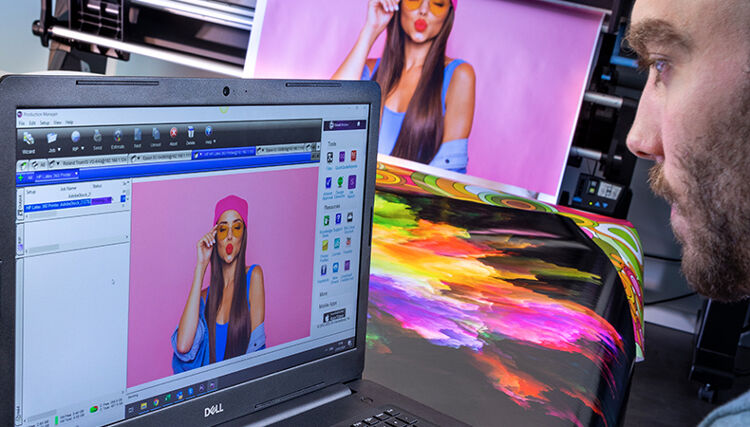
Choosing the right RIP can be a difficult yet an important decision for any printer. Sonja Angerer discusses how to find the right product for your print shop.
A space, a printer, and fast internet uplink: Setting up a basic print shop seems easy enough. But as operations grow, so does the need to expand product lines and get more organised or even automatised. While it is the printing machines that usually receive most of the attention, today, the RIP software is as important for printers. Let’s review the most important factors in choosing the right RIP for your company:
- What do RIPS do?
- What are the costs for a RIP?
- Do I need help setting up a RIP?
- What are the specialty RIPs available and why would I need one?
- Can a RIP help with automation, and how?
RIPs in the print shop
But RIPs also scale, mirror, rotate, and nest layouts. Being able to nest data to use the substrate efficiently to avoid waste has become a vital part of ripping, with elaborate algorithms available for high-end, high-speed production RIPs.
Many entry-level wide format printers come bundled with a basic RIP, e.g. Roland DG VersaWorks, Mimaki RasterLink or SAi FlexiPRINT HP Edition. The bundles will only work with the printer they come with but offer advanced control with proprietary features like multi-pass varnish, white, neon, or metallic inks.
“Bundled RIPs are often an easy way to print an image and allows for cost-effective printing equipment. The software can only take a snapshot approach to the printer, unfortunately it is not designed to provide a workflow. A workflow can be set-up and can offer lots of potential for the production optimisation. (…) Also, a dedicated RIP can mean more features and support”, says Joachim Rees from Multi-Plot Europe GmbH.
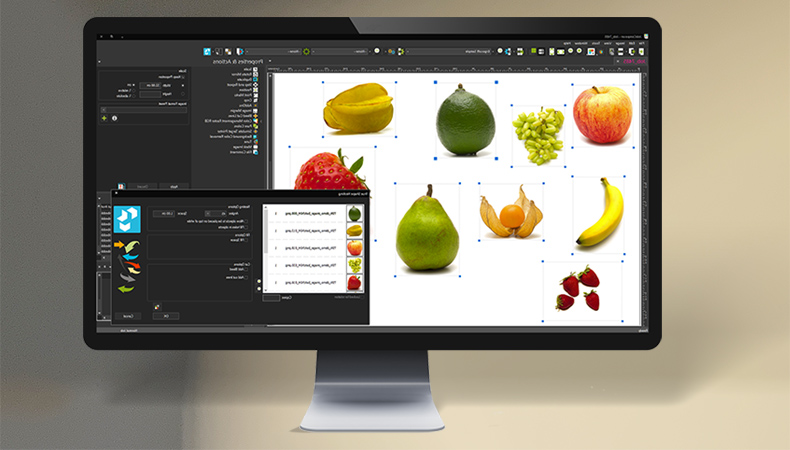
CAPTION: Modern RIPs like Ergosoft 16 offer sophisticated nesting options. This allows you to save material and avoid waste. Photo: Ergosoft.
What does a RIP Cost?
General purpose RIPs from Caldera, Colorgate, Ergosoft, Onyx, PrintFactory, SAi or Shiraz, are names of the companies for some of the market-leading brands, where prices can start from 1000 Euros or more for a lifetime license, if available.
Many manufacturers of RIP software may have borrowed a page from Adobe and Microsoft, offering subscriptions for cloud-enhanced RIP services, prices can start at around 100 Euros per month for a subscription for a small number of printers.
For large-scale RIPs these are required to control production lines with dozens of machines, the annual cost for subscriptions and service fees can be quite substantial. It is important that the right RIP is chosen for your shop as this could directly affect your profit line if incorrectly ordered.
Do I need help setting up my RIP?
Setting up a RIP very often also means establishing a de-facto-workflow in the print shop. Putting up a concept or getting some workflow counselling therefore not only helps the RIP to run more smoothly but also may greatly increase production efficiency.
RIPs that are combined with a printer usually get their initial set-up from the server technical that also installs the printer.
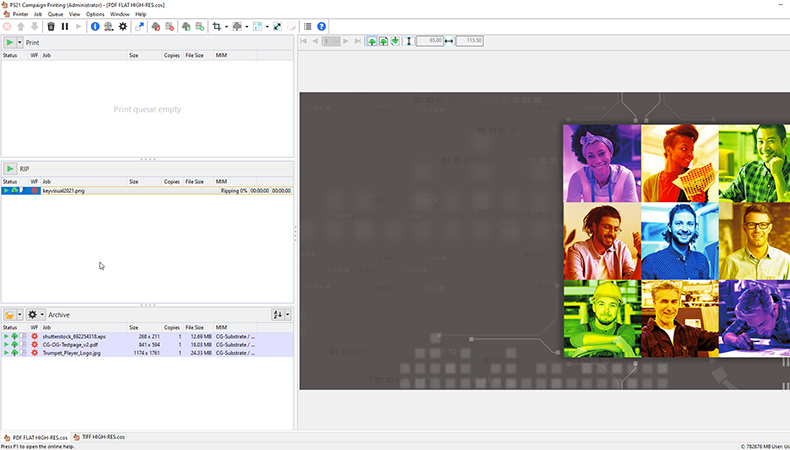
CAPTION: Colorgate Productionserver is also available as specialist RIP for a number of industry applications, including textile and décor printing. Screenshot: Colorgate.
What are specialty RIPs and why would a printer need one?
- textile (direct /sublimation prints, DTG)
- ceramic
- decor
- photo
- raster films
- proofs
“Additional factors need to be required regarding decorative printing of designs on textiles e.g. step & repeat, multicolour printing and evaluations, which are important pillars in a modern micro factory”, explains Rees.
Can a RIP help with automation, and how?
“Process automation has become an indispensable part of the everyday life of print service providers. Ergosoft offers the entire range of possibilities from job automation with job and image agreed monitoring of the entire production with ErgoLytics, automatic job processing with Delta Automation to the connection of an external ordering process via Ergosoft Stream”, says Anna Tobler, Ergosoft CEO.
“PrintFactory software has built-in automation via XML or JDF support and end users can integrate this software to front end Web to Print, Automation Workflows and MIS systems, making the software solution even more attractive. Powerful automation tools and templates are also include, which removes the need for repetitive tasks saving lots of pre-print time”, stresses Debra Roussouw, Marketing Manager at PrintFactory.
High-end colour quality often demands individual printer profiles. Many RIPs offer colour management modules or extensions. They are also compatible with market-leading measurement devices, e.g. from Xrite or Barbieri. Choosing a RIP with a colour management module can help improve overall print quality while reducing costs for external colour management services.
“PrintFactory's industry proven colour engine included is unparalleled in its accuracy and provides the highest-level proofing grade colour management for all driven devices. Greys and neutrals are the widest and cleanest spot colour rendition with the most complete spot tables available anywhere. Customers can easily re-calibrate printers to such tight tolerances as to be able to load balance jobs across printers of the same model, also re-print ‘identically’ files printed days, weeks or even months prior…… unlike any other LFP RIP”, says Roussouw.
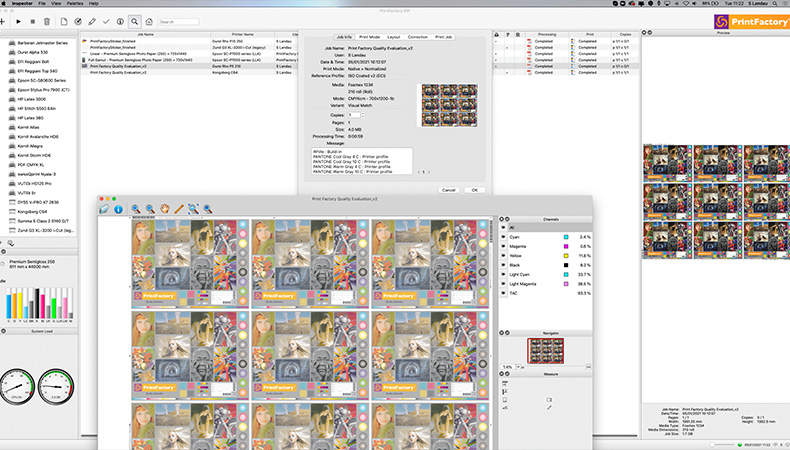
CAPTION: PrintFactory’s color engine offers highest-level proofing grade colour management. Screenshot: PrintFactory
How to find the perfect RIP?
- RIP Features: Make sure to consider the features of a RIP before making your purchase. A RIP with more features may be more expensive, but it may also be more beneficial for your shop.
- RIP Setup and Configuration: If you are unfamiliar with RIPs, you will likely need assistance in setting the software up.
- RIP´s total costs: A powerful, highly automated RIP will likely require (additional) cloud service subscriptions, a service contract as well as intensive and recurring staff training. As this adds cost to every single square metre printed, a high turnover is usually required.
Topics
Interested in joining our community?
Enquire today about joining your local FESPA Association or FESPA Direct
Recent news

The importance of Personalisation in Direct Mail - The Power of Print
Jeroen van Druenen, CCO of Jubels discusses how personalised direct mail, especially print, boosts engagement and ROI by tailoring content to individual recipients. Using variable data printing (VDP), marketers create unique designs and offers, enhancing relevance and fostering stronger customer relationships. Physical mail's tangibility and lasting impact further amplify personalisation's effectiveness.
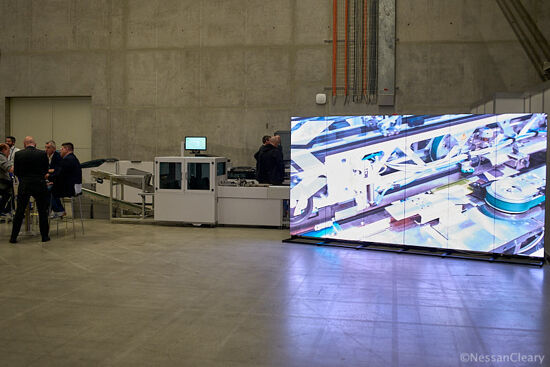
What are the current trends for digital screens?
Digital screens are evolving rapidly, moving beyond simple signage. MicroLED technology improves resolution and efficiency, while 3D and AR displays offer immersive experiences. AI is transforming content creation and analytics, personalising interactions and optimising screen placement. Larger, wall-sized screens and temporary rentals at events are becoming more common. As screens become ubiquitous, innovation focuses on eye-catching solutions to maintain audience engagement.
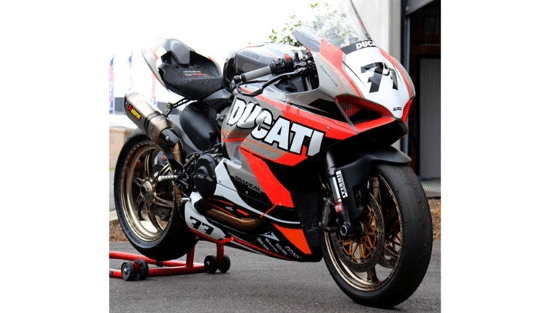
Hints and tips for vehicle wrapping success
While rising demand for vehicle wrapping is good news for the industry, this is placing more pressure on companies to deliver quality work at a solid pace. Here, Rob Fletcher picks up some tips from several experts in this sector to help wrappers operate smoothly.
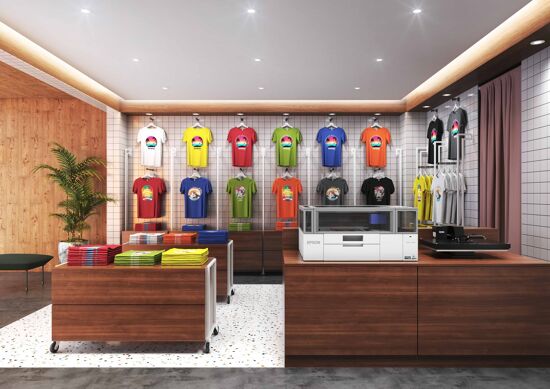
What are the opportunities in Personalisation for Sportwear and Signage?
Rob Fletcher discusses the growing importance of personalisation and digital innovation across sectors. Major brands use personalised print to engage customers and boost sales. Personalised sportswear demand is increasing, and companies like Eurojersey embrace sustainable manufacturing and digital transformation.